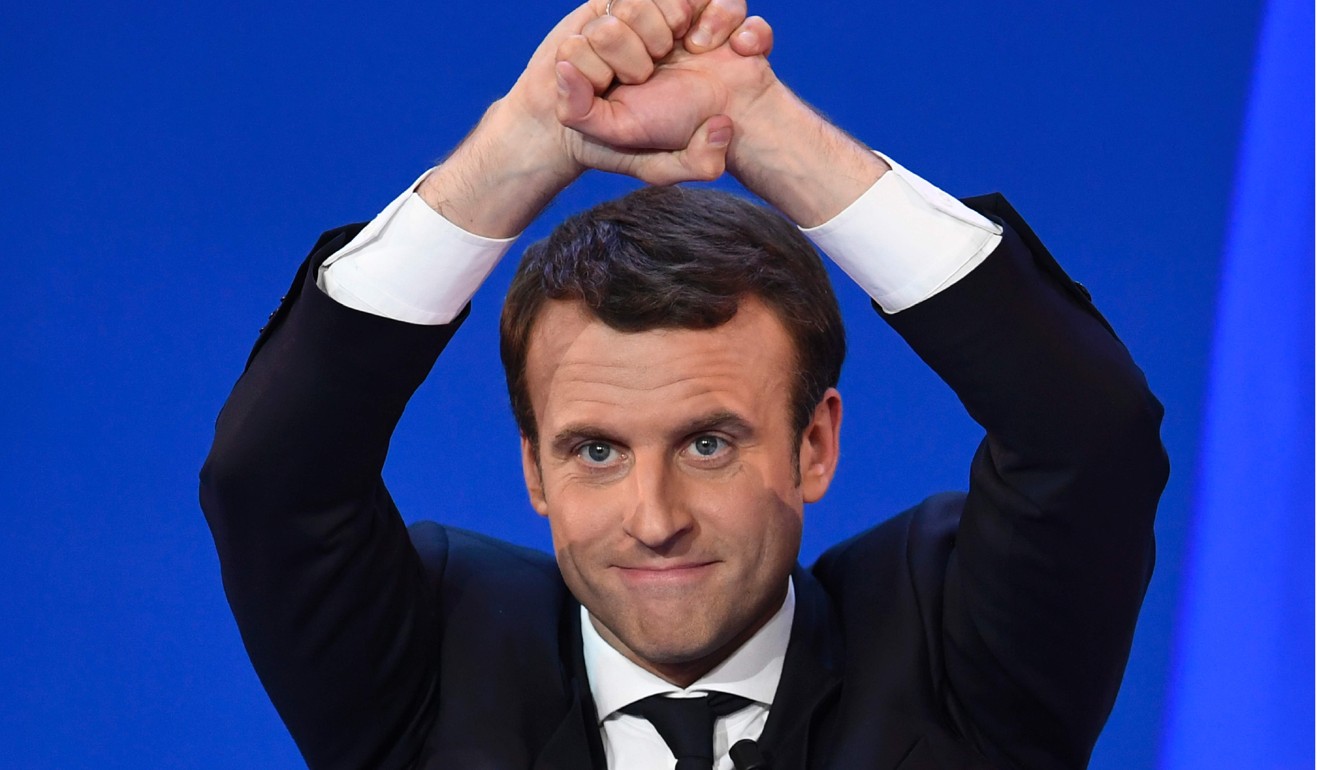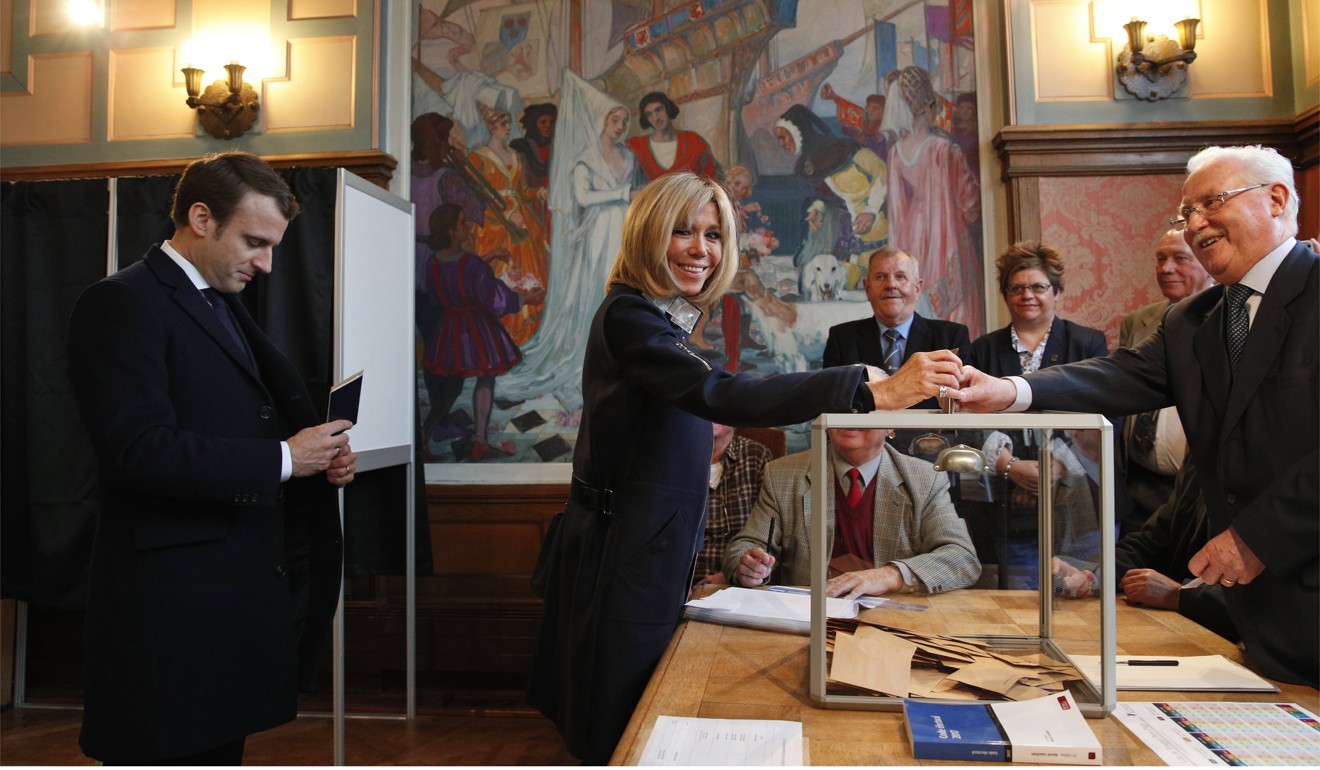
Analysis | The improbable rise of Emmanuel Macron, poised to become France’s youngest leader since Napoleon
Three years ago, hardly anyone knew his name.
But in a once-unimaginable scenario, Emmanuel Macron - at 39, the boy wonder of an ageing political establishment - won the French presidency Sunday with a tidal wave of popular support. He will soon be France’s youngest head of state since Napoleon Bonaparte as well as its first modern president not to belong to either of the centre-left or centre-right parties that have run this country for 60 years.
After the success of the Brexit campaign in Britain and the upset victory of Donald Trump in the US presidential election, Macron’s win has been billed as having curbed the global tide of anti-establishment populism. In the vote’s second and final round, he defeated Marine Le Pen, the leader of the far-right National Front, a strongly anti-immigrant party tainted by the perception that it is tolerant of anti-Semitism and Nazi nostalgia.

“It’s entirely unprecedented in the Fifth Republic,” said François Heisbourg, a well-known French defense expert who has advised Macron on security and terrorism issues. “It’s extraordinarily unusual, the way he has broken through the system - coming from nowhere.”
Macron, who has never held elected office, has now been elected to one of the most powerful executive offices in the Western world, holding the top job of the second-largest economy in a troubled Europe. How he did it, analysts say, rests on a combination of luck and a campaign message attuned to a new political moment.
I have known failures, sometimes bitter, but I have never allowed myself to turn away
In France, 2017 proved an ideal year to run as an independent candidate. A rare political vacuum emerged, and Macron - a former Socialist economy minister who stepped down from his post in July - was able to take full advantage of it.
With the public frightened by a slew of terrorist attacks by Islamist extremists, and with employment at double digits, France’s Socialist Party, under incumbent President François Hollande, sank to historic levels of unpopularity. Largely for the sake of the party, Hollande promised in December not to seek re-election, but his Socialist stand-in, Benoît Hamon, was eliminated in the election’s first round, winning just a meagre 6.35 percent of the vote.
France’s mainstream conservative party, Les Républicains (the Republicans), were undermined by a spending scandal involving François Fillon, its contender. Once the undisputed favourite, Fillon suffered a fatal blow after Le Canard Enchaîné, a French satirical newspaper, accused him of funnelling about 900,000 euros (US$990,000) of public funds to his wife and children for work they never did.

Defending an open, multicultural society was a central component of En Marche (Onward), the movement Macron launched in 2016. “Globalisation can be a great opportunity,” he said at one point on the campaign trail. “There is no such thing as French culture,” he said at another. “There is culture in France, and it is diverse.”
The great French novels are often stories of ambitious young men from the provinces who come to Paris to seek their fortunes. For many, Macron is no exception. The literary son of doctors from provincial Amiens, he graduated from France’s elite École Normale d’Administration, the traditional breeding ground of presidents.
Some in the French press have placed the first sign of Macron’s formidable ambitions in, of all places, his love life - namely, in his dogged pursuit of his wife, Brigitte, his former high school teacher and a woman 24 years his senior. As Brigitte Macron told a French documentary maker last year: “Bit by bit, he defeated all my resistance, in an amazing way, with patience.” The candidate showed the same persistence in capturing the Elysee Palace.
“I have known failures, sometimes bitter, but I have never allowed myself to turn away,” Macron wrote in his 2016 book, Révolution.
That doggedness - along with a calculating eye for useful associations, critics say - brought him into contact with many prominent French thinkers and government officials, who then helped him advance.
In the late 1990s, while still a graduate student, Macron worked as an assistant to Paul Ricoeur, a prominent French intellectual and writer; by the mid-2000s, he was working for the Finance Ministry, on a commission dedicated to stimulating economic growth. It was there that he met Jacques Attali, a prominent economist and Parisian power broker who many say later ushered Macron along a speedy path to the highest echelons of the Hollande administration.
In an interview, Attali, who has also served as an adviser to the Macron campaign, rejected out of hand the idea that the candidate was mainly a gifted networker. “He would be where he is today with or without my help,” Attali said.
If Macron’s ambition has led him to considerable success, it has also earned him enemies - including, some say, Hollande, whom he served as economy minister but then abandoned to launch his party. “Emmanuel Macron betrayed me methodically,” Hollande said last year, according to Le Monde newspaper.
Jean Pisani-Ferry, another Macron adviser and the author of much of the candidate’s platform, brushed off the comment.
“He launched another politics, created a new movement. Political life wouldn’t exist otherwise,” Pisani-Ferry said in an interview.
Despite the improbable nature of Macron’s victory, France’s new president will face a considerable challenge as he attempts to form a government. Given that he has no party structure behind him, he will be deeply affected by the results of parliamentary elections, slated for June.
“There is huge uncertainty regarding the parliamentary elections to come, because France’s main political forces were largely absent in the second round - the traditional right wing, the Socialists and the far left,” said Patrick Weil, a leading French legal scholar and historian. “Now they are frustrated, and they are ready to take their revenge in the legislative elections.”
In the past, when the National Front made it to the final round of the presidential election, the rest of the political spectrum united in opposition to the extreme right. But this year, certain politicians hesitated to back Macron in the final round, notably the far-leftist Jean-Luc Mélenchon. Many voters also opted to abstain or to cast blank ballots.
“You might have higher mobilisation for the parliamentary elections than usual, which, given turnout in the presidential election, could mean a higher legitimacy for the parliament than for the presidency,” Weil said.

